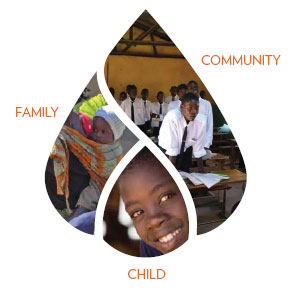Supporting the Grassroots at Times of Crisis
 The destruction caused by the earthquake and tsunami in Japan last week has inspired many to donate to recovery efforts. Wanting to help families locate loved ones and to support the months and years of recovery efforts that lie ahead have reminded us that we live in a globally connected world. Only four days after the disaster, American donors had already contributed more than $46 million to recovery efforts according to the Chronicle of Philanthropy. A crisis of this magnitude brings out some of our best humanitarian tendencies.
Crises often bring people to international philanthropy efforts who haven’t given overseas before or who have given in small amounts they’ll now increase. We saw a similar interest after the earthquake in Haiti last year and the 2004 Indian Ocean Tsunami. Many donors will give to the easy-to-spot organizations like the Red Cross and the International Rescue Committee who are equipped to receive donations on this large scale. The donors who want to find local nonprofits who were already working in their communities will have to look further.
The destruction caused by the earthquake and tsunami in Japan last week has inspired many to donate to recovery efforts. Wanting to help families locate loved ones and to support the months and years of recovery efforts that lie ahead have reminded us that we live in a globally connected world. Only four days after the disaster, American donors had already contributed more than $46 million to recovery efforts according to the Chronicle of Philanthropy. A crisis of this magnitude brings out some of our best humanitarian tendencies.
Crises often bring people to international philanthropy efforts who haven’t given overseas before or who have given in small amounts they’ll now increase. We saw a similar interest after the earthquake in Haiti last year and the 2004 Indian Ocean Tsunami. Many donors will give to the easy-to-spot organizations like the Red Cross and the International Rescue Committee who are equipped to receive donations on this large scale. The donors who want to find local nonprofits who were already working in their communities will have to look further.
The small, grassroots organizations who will be busy finding the children and families in need of food and resources will be harder to find. They don’t have the marketing arms to reach American donors or to make donations simple through a website donate button. Even if they did, this influx of funds can be difficult to manage and to account for several months later when donors want to hear how their funds were spent.
Still, we know that grassroots organizations need the support. Communities who were struggling before a crisis will continue to be the hardest hit. The inroads grassroots organizations have created with vulnerable groups will be particularly important during a crisis. As we’ve seen at Firelight, community-based organizations are particularly adept at stretching resources and meeting demands that can seem impossible to others.
It’s these organizations that will know where to reach marginalized households, or help reunite separated parents and children. They know what victims are most in need of. They will bring community members into recovery efforts, and connect those in remote areas to government resources. Grassroots organizations will lead their community in not just relief and rebuilding, but in creating a civil society that addresses past problems.
As an international funder, we know the power that global donors can bring to communities that will be stressed and have sparse resources. We also know that for recovery to be complete and equitable it will need to be spearheaded by leaders who live and work in those communities.
It may require a closer look, but there are ways to reach the grassroots during a crisis. Community foundations or intermediary organizations that already have partnerships in the area can often respond swiftly and effectively. They will already know grassroots organizations and help them to strategically respond to this new set of needs. These foundations are typically equipped to receive and manage funds on a larger scale and can reach into their broader networks for additional support as recovery begins.
Firelight’s own grantee partner network is focused on Africa and does not extend to Japan. But we can make referrals. As we looked into Japan recovery efforts, we found these organizations with long-term partnerships in the area: Give to Asia and Global Green Grants. GlobalGiving is working to add experienced Japanese community-based organizations to its website, giving them a simple channel through which to access donations from the US.
Though Firelight does not work in Japan, our experience in Africa is relevant here. Our donors enable community leaders in sub-Saharan Africa to use their limited resources to drive real change. While we’re based in the U.S., we reach 130 community organizations in 10 African countries with daily communication. We know it’s possible to reach small, effective organizations. Donors allow for networks like ours to remain active at some of the most difficult times.
We encourage individuals and foundations looking to help in Japan to fund the grassroots. Take that extra time to find the organizations that need support, but may not be in your inbox the next morning. Even small donations make a significant impact for community-based organizations.
